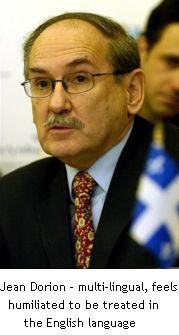 The reaction of many people to being kept waiting for 20 hours in a hospital emergency ward in Quebec might be to worry, or complain, about what seems like a chronic shortage of medical personnel.
The reaction of many people to being kept waiting for 20 hours in a hospital emergency ward in Quebec might be to worry, or complain, about what seems like a chronic shortage of medical personnel.
Sitting for hours on a hard chair in a room with other injured or ill people, watching for the faintest hint that the one overworked doctor might see you now, could lead a sensible person to think that whatever Quebec is doing to find more health care workers, it isn't enough.
Jean Dorion, the head of the Société St. Jean Baptiste de Montréal, takes a different approach. His reaction to waiting nearly a day for care was to call for French to be made the working language in all Quebec hospitals, including the few remaining bilingual hospitals.
Why? Because when he was finally seen by a doctor, the doctor asked if he spoke English.
Dorion said he replied that he did speak English. "I was treated in English," he said. "I found it humiliating."
He further suggested that if he had asked for treatment in French the doctor might not have looked at his case "with a very favourable prejudice."
This is ridiculous, to say nothing of offensive. Dorion has the nerve to suggest that a medical practitioner would take less care with his health if he asked to be treated in one of Canada's two official languages.
Dorion provides nothing in the line of proof for this odious suggestion. So pressed is he for ammunition for his make-everything-French cause that he has to go back seven years to unearth a study by the Office Québécois de la langue française.
This dusty study shows, Dorion said, that 18 percent of francophone patients treated in bilingual hospitals said they had been "in contact" with medical workers or other personnel who lacked a "sufficient" knowledge of French. Is he kidding? What does "in contact" mean? Who defines "sufficient"?
More recently, according to information compiled by the Office québécois de la langue française, it received a grand total of five complaints on the subject of language use in hospitals. Four of the complaints concerned language on signs; only one had to do with language of service. Exactly one complaint in the course of a year. In a normal world, that would be considered a triumph. It is a triumph.
Some hospitals in Quebec are allowed to be bilingual but must make French service available - and by the evidence, they do just that. This requirement does not mean that every single person working in a bilingual hospital has to be perfectly bilingual. Dorion, for instance, doesn't even know if the doctor who asked if he spoke English was bilingual. It appears that Dorion preferred getting a chance to complain to the simple expedient of asserting his right to be helped in French. What nonsense.
If any group is having trouble communicating in hospitals, it is rural anglophones. The regions are becoming more unilingually French even as unilingual anglophones grow older and require more medical care. Now there is a real problem.
Source: The Gazette
Editor's opinion:
"How does that work, open heart surgery in French? Or getting a French flu shot? Complaining about something like that, after having waited for 20 hours? To magnify a futility like that can only come from a French speaking nitpicker. Humiliated? What's so humiliating about the English language? How many people, on a world-scale, actually speak French and why is that do you think? Of course there are many nice francophone people, but in general as a people, is there anyone that likes the French? I know in Europe nobody really does. They don't even like each other, hence the cold relationship between the French from France and the ones from Quebec!"


No comments:
Post a Comment